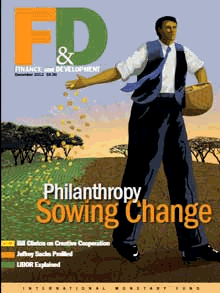
Typical street scene in Santa Ana, El Salvador. (Photo: iStock)
IMF Survey: Philanthropy Helps in Fight Against Global Social Problems
November 29, 2012
- Philanthropy, social entrepreneurship step in when official donors reluctant
- Donors more focused on maximizing impact when trying to solve social ills
- Government-civil society cooperation key to success, says Bill Clinton
In the face of the global financial crisis and pressure on governments to curtail official development assistance, philanthropy and social entrepreneurship are supplementing the demands of the poor and needy.

Children study by kerosene lantern during outage near Lucknow, India. Social entrepreneurs invest in solar lanterns (photo: Pawan Kumar/Reuters/Corbis)
TARGETED GIVING
The December 2012 issue of the IMF’s quarterly Finance & Development magazine looks at how private donors are substituting for cash-strapped governments.
New and innovative solutions are just waiting to be discovered and implemented, according to both university professors who study the subject and philanthropists who practice it, such as former U.S. president Bill Clinton, who writes in the issue about finding “new ways to extend the circle of opportunity so that every person—in every country—has the opportunity to succeed.”
Clinton, who now heads a foundation that seeks to coordinate global philanthropic efforts, says corporations are realizing that sales increase when societies and markets are strong, and are increasingly integrating the public good into their business models. Technology allows people to easily donate small amounts via text message or the Internet, “democratizing charitable giving like never before.”

December 2012 issue of F&D features article by Bill Clinton on power of collaborative networks to solve social problems (illustration: Michael Gibbs)
But the biggest transformation comes from what Clinton calls “networks of creative cooperation—where stakeholders from government, business, and civil society have come together to do things better, faster, and cheaper than any could alone.”
The Clinton Global Initiative brings these groups together once a year and asks them to commit to solving one of the world’s most pressing problems. “We make the best decisions when we talk to people who know things we don’t and understand things differently,” says Clinton.
Social entrepreneurs focus on impact
Social entrepreneurs are working to solve development problems such as HIV/AIDS, youth unemployment, and lack of reliable electricity, writes J. Gregory Dees of Duke University.
Dees defines social entrepreneurship as the pursuit of new ways to tackle a social problem, with a range of business models from grant-dependent nonprofits to commercially viable for-profits.
He cites the examples of mother2mothers, a nonprofit that offers mentor counseling for mothers diagnosed with HIV; social enterprise Digital Divide Data, which prepares poor Cambodians for unemployment in the digital data field; and for-profit producer of solar-powered lanterns d.light.
Social entrepreneurs bring money, ingenuity, and specialized knowledge to the table, he says. Most important, perhaps, they have a willingness to take risks and a nimbleness that traditional foreign assistance lacks. They excel in three categories: testing innovative solutions; leveraging resources; and helping societies to adapt.
Rigorous assessment of such projects is difficult, cautions Dees, but those that can demonstrate they are effective can then partner with governments or private investors and scale up in scope as needed.
Contributing every which way
Philanthropy and private investment are increasingly important in the global fight against poverty, according to Yale University economics professor Dean Karlan.
While the United States has been the largest single donor in absolute terms, European countries contribute much more per capita, and other countries contribute in different ways—through technical assistance or investment in infrastructure and industry.
“Charitable donations support the vulnerable in times of need when markets or governments can’t or won’t do so,” says Karlan, but the dependence of nonprofits on donations makes them vulnerable to fluctuations and therefore not financially sustainable.
Investment in developing countries ensures that demand from the beneficiaries keeps successful programs afloat. Money from private donors helps catalyze solutions for the poor, and the developing world’s problems are increasingly solvable without subsidies—that is, they are sustainable.
Jeffrey Sachs profiled
Development economist Jeffrey Sachs, Director of Columbia University’s Earth Institute, has focused for the past decade on ending poverty in Africa. He is the subject of December’s F&D People in Economics profile. Sachs helped singer Bono campaign for debt relief and he championed the Millennium Development Goals, the United Nations’ targets to reduce poverty around the world.
His latest undertaking is the Millennium Villages Project, which provides large-scale aid to counter poverty and disease in Africa through high-yield seeds, fertilizer, drinking wells, building materials for schools and clinics, insecticide-treated mosquito nets, and antiretroviral drugs.
He is probably the only economist to have instructed actress Angelina Jolie. “I didn’t go to college so I got an education in economics and life from who I believe is one of the smartest people in the world when it comes to that,” said Jolie in an MTV video during a visit with Sachs to Africa to learn about his project.
■ Also in the December 2012 issue of Finance & Development, IMF economists find that commodity price spikes are more likely to pass through into general inflation levels in countries that already have high inflation and weak institutions; fighting income inequality with spending that redistributes benefits is more successful in advanced economies than developing; and while the central, eastern, and southeastern countries in Europe have been largely sheltered from the ongoing euro area crisis, that could change quickly.


